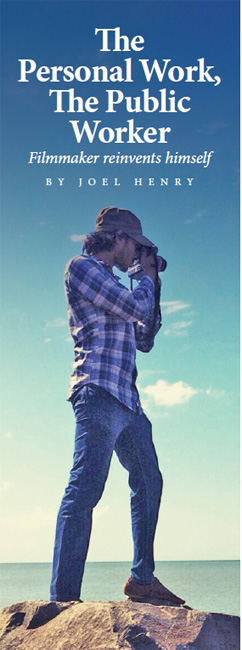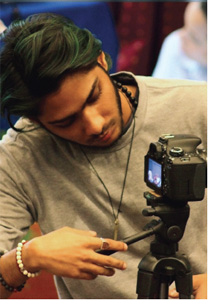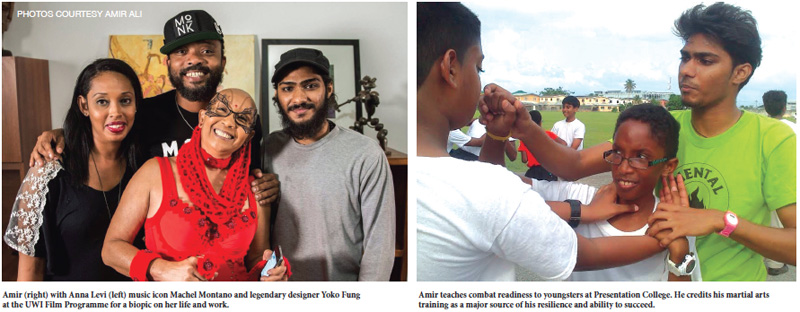
 "I heard a quote once from somebody," Amir tells me. "You don't see the art on the screen. You only see the ashes." "I heard a quote once from somebody," Amir tells me. "You don't see the art on the screen. You only see the ashes."
He is conveying to me the level of research and planning that went into the creation of his documentary film "Who I say I Am."
"Ninety percent of the work that you do is before you actually film," he tells me. But in going back over the interview, in transcribing the notes, it seems clear that the quote works just as well as a description of the young filmmaker himself.
Amir Aether Valen Ali, age 22, a student of The UWI St. Augustine Film Programme, gave a powerful introduction to his work at the 2016 Trinidad and Tobago Film Festival. He won awards for both Best T&T Short Film – Documentary and the United Nations T&T Award for Best Emerging Documentary Filmmaker (click here).
It was an impressive victory but not as impressive as Amir's true creative endeavor – himself.
"People need to be more self-aware," he says. And he practices what he preaches.
Writer's cheat. And a writer with a word limit is a massive cheater. For a story like this, in the limited space and time provided, you have to pretend you have the essence of an individual. You construct your own narrative about the subject, you take short cuts and hope it’s accurate enough. But how can you attempt to capture in brief what someone has worked so hard to create? All I can say with certainty is that I have encountered few people so focused on understanding themselves and doing the work to become a better person.
“In secondary school I heard a quote from Chuck Palahniuk,” he says. “The first step for any young person with drive and talent but no money to change their world is to change their culture. To write the books, paint the art, make the music, shoot the films.”
He says, “I always wanted to change my world. After I heard that quote I made the decision to go into film to do so.”
The most immediate display of what Amir calls “his workaholic self” is in the short documentary. Beautifully shot, “Who I Say I Am” is made up primarily of interviews with a cross-section of people, asking them about their names and their names’ connection to their identity. Its 30-minute length is just a fraction of the time spent on the project – especially the research component, the 90%. Academic papers on identity and the effects of naming, books on globalization, and even the Orisha tradition, all form the references for the film.
Identity is his grand theme. Like Hemingway’s Old Man with his fish, he has developed a universe around it, one that is simultaneously personal to his life and experiences but also universal in what he views as its capacity to improve people, and by extension, society.
“Film is more communication and behavioural science than art to me,” he says. “From what I’ve seen online and among my peers who don’t know about film they think of it just as individualism and personal expression. If the person on the other end doesn’t relate to what you put before them then it’s just for you. It’s not changing anybody.”
And change is the goal. Film is just the medium.
Every topic we discuss – from film techniques to superheroes (Superman is his favourite because of his adherence to his moral code) – it’s clear he has given great thought to the things that interest him. The influences he cites, while including filmmakers such as Terrence Malick, comprise an unorthodox mix of writers (Neil Gaiman), psychologists (Jordan Peterson) and billionaire motivational speakers (Gary Vaynerchuk). If anything connects them, it’s a muscular doctrine of self-development.
"That's what drives me, trying to make people better," he says.
From his appearance in "Who I say I Am" or in photos following his film festival win, Amir looks like the conventional depiction of a film student – waves of green dye in his hair, close-cropped beard and bright, smiling eyes. But his life experience has not been conventional.
Initially he had no intention of even being a filmmaker. As a student of Presentation College in Chaguanas, he was required to work consistently towards academic excellence with a goal of getting into a professional field.
"Most people there were into medicine, engineering or law. You had to fall into one of those categories," he says.
Amir started making short films in Form 4 "just for fun". It became his mode of self-expression.
"I never really acted up in school," he says. "I just didn't follow the trend. I didn't follow the path they wanted me to take. Teachers used to tell me all the time I could get a scholarship in engineering or something else, but I found I didn't really care about that. Making short films did more for me personally."
If there were oppositional forces at Presentation College, the forces at home were much worse. Amir grew up in rough economic circumstances in Warrenville, Cunupia and there was anger and violence in the home.
 “My mother had to go through a lot and when things started to get really bad and she decided enough was enough and that she was going to leave, they made it extremely hard on her. During the height of the family breakdown I saw the worst sides of everyone in my family. Some things people did were unforgivable,” he says. "I think I learned more from seeing their mistakes. More of who I am is based on not wanting to have certain qualities that they have." “My mother had to go through a lot and when things started to get really bad and she decided enough was enough and that she was going to leave, they made it extremely hard on her. During the height of the family breakdown I saw the worst sides of everyone in my family. Some things people did were unforgivable,” he says. "I think I learned more from seeing their mistakes. More of who I am is based on not wanting to have certain qualities that they have."
It was this urge to distance himself from family that partially prompted him to change his name.
"In 2015 I started reevaluating my identity and my life, and what I wanted out of the rest of my life. I felt like the name Amir Ali represented me, but didn't fully represent who I was anymore, and certainly wasn't going to represent who I wanted to be later in life. So I decided at the end of 2015 to add the names 'Aether' and 'Valen' and make the documentary film throughout 2016 about the impact that a person's name has on their identity, and how it influences their sense of self," he says.
“Aether” has several meanings but the one Amir likes best comes from Ancient Greece – both the personification of light and the air that the Gods breathe. “Valen” is a Latin root word meaning “strong.”
“I treat each of my names as a different entity. Sometimes I talk to myself as Amir, sometimes I talk to myself as Aether, sometimes I talk to myself as Valen. To me, a name is not merely a conglomeration of letters put together as a convenient way for someone to refer to me. I treat them as part of my identity,” he says.
Of all the labour beneath the surface of “Who I Say I Am” this is the most crucial, the personal work. But in the film he is only one of several people asked to grapple with the topic. Amir asked them the same questions he asked himself. It’s a striking blueprint for life and art: self-examination, personal development and creative expression that uses the personal for communal benefit.
"I think if everybody knew themselves better they would be the best version of themselves. And if everybody is the best version of themselves then the world would be better. As they say, 'fix yourself, fix the world'."
Film studies in Cuba
By the time you are reading this, Amir will most likely be in Cuba, attending the International Film and TV School in San Antonio de Los Banos. He will be undertaking a three-year Master’s programme in Documentary Direction, all costs covered thanks to a scholarship from the Cuomo Foundation, an Italy-based organisation that funds health and educational projects in the developing world. It was an unexpected gift in what has already been an incredible season of success.
"I didn't even consider leaving the country before," he laughs. "The first time I was ever in a plane was earlier this year. One of the prizes when I won the film festival was a trip to the Rotterdam Film Festival in Curacao."
Amir received the scholarship through the assistance of author Anna Levi, who met him while working with the UWI Film Programme.
“The Directing class was given chapters of my MFA novel in progress to adapt my stories to film. Amir's adaptation of (my story) “The Nowarian” was impressive,” she says. “Amir has a sense of humility and he is passionate about film. He is a star.”
Anna, a graduate research assistant at the Film Programme, helps deserving students find scholarship and graduate-level opportunities. She was contacted by the Cuban Embassy about the Cuomo Foundation scholarship and encouraged Amir and others to apply. They are currently working on a documentary called “Super Freak” about legendary fashion designer, Yoko Fung.
At Rotterdam, Amir met members of the industry and festival coordinators from around the world. He attended workshops held by Academy Award-nominated filmmakers. A new world of potential has opened for him.
"My big goal is to affect as large an audience as possible," he says. "I had the ambitions but I knew I didn't have the money to go abroad and do anything. Now the opportunities have come."
He is quick to point out that even without the developments that have come from his winning film he was determined to create with whatever resources he had.
"I'm perfectly fine with using the tools I currently have. But if new tools come I will take it."
If there is one lesson to be learned from the young filmmaker, especially by other aspiring artists, is that the success he has achieved in his short career was paid for with one ultimate currency – resilience.
"I've seen so many people who are better than me, who are more talented than me, who have way more skill. But under pressure they crack. Sometimes it’s only a little pressure and they crack," he says.
"I have been broken down so much that nothing can break me lower. Because of that I can persevere. It gave me a thicker skin to deal with the world. Somehow I do better when I'm under pressure. Too many artists complain about what they don't have rather than using what they actually have and making it work."
Most tellingly, he's also a martial artist. Amir trained with a group of martial artists and soldiers, including well-known self-defense expert Major Sarwan Boodram, from a very young age. This wasn't the typical karate training that tends to emphasize proper form and light contact sparring. The training was reality-based and with military discipline.
Amir recalls, “my first year in primary school I was the smallest person. There was one student who used to bully me. The next time he came to bully me he couldn’t do it anymore.”
He was five years old at the time but he had already learned an enormously valuable life lesson. Bullies can be defeated once you are willing to do the work of defeating them. The work was brutal.
“Back then we used to get blows,” he says. “They put us in real fight scenarios. People got busted up and stitched up. I lost a tooth. I was 11.”
It sounds rough but it’s clear he remembers those days fondly, as well as his instructors, who he credits with training them with military-style discipline. Training which in turn gifted him with military-style endurance.
"We used to train at the barracks sometimes. Sometimes we had to wake up at 11 pm, train until 3 am and then sleep until 4 am. That is why I don’t sleep much. I can go on just a couple hours for a couple days. That training gave me some of the traits that I need to survive in the world.”
“The focus wasn't really on winning. It was on survival. That mentality is what permeates throughout my lifestyle. Film is more my profession but martial arts is more my way of life,” he says.
It's funny, because we tend to think of art as a frivolous pursuit and creatives as indisciplined dreamers. Many artist themselves rely on their innate talent and inspiration to fuel them and when those are not enough they collapse. The truth is that to thrive, to succeed in a profession that is naturally devalued, you have to be more focused. You have to self-generate whatever it takes to continue the work.
Author Steven Pressfield, writer of "The War of Art" says artists must be like soldiers because creativity is an act of war against the numerous forces of resistance. There's one striking scene in "Who I say I Am" where the young filmmaker sits on an outdoor couch next to a little girl. Smiling, relaxed, with a Nescafe cup in hand he asks her, "Do you think that your name is a crucial factor in the development of self and your individualistic identity?" Occupied with her drawing she responds "yeah!" He tilts back his head and laughs. It's the laugh of a soldier during a lull in the fighting. It's a laugh of someone who is winning the war.

|





